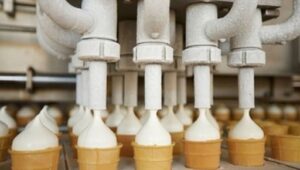
The Antimonopoly Committee of Ukraine (AMCU) has allowed businessman Vadym Hryhoriev’s Zhytomyr Furniture Plant to buy real estate in Kiev, which was sold by the State Property Fund (SPF).
The corresponding decision of the AMCU approved July 6, reported on the website of the agency.
Earlier, Zhytomyr Furniture Works won the FGI auction on privatization of the historic building of the former Hermitage Hotel in Kiev on May 25. As reported by the FGI in June, the investor paid UAH 373 million to the state budget for the acquired asset.
The winner of the auction is obliged to apply to the relevant cultural heritage authority and conclude a protection agreement within a month after the registration of ownership of the privatization object.
Experts interviewed by Interfax-Ukraine estimated the necessary initial investments in the restoration of the buildings of the Hermitage Hotel at EUR8-10 mln.
The buildings were erected in 1902-1904 according to the project of Kiev architect Andrei Ferdinand Krauss – the author of many buildings constructed in the capital at that time. The house was one of the best hotels in the city “Hermitage”. The owner of the house was a millionaire and brick manufacturer Jacob Bernard. The end wall in the 1960s was decorated with a mosaic panel “Ukrainian Song” by Stepan Kirichenko.
These buildings have a protected status. In 1998 they were included in the list of historical and cultural monuments of local importance by the order of Kyiv City State Administration.
According to Opendatabot data, Zhytomyr Furniture Factory PJSC (ZhMK JSC), registered in 2003, authorized capital is UAH 4.9 mln. The ultimate beneficiary is Vadym Grigoriev.
At the end of 2021, the FGVFL sold the main office of VTB Bank, located at the intersection of Pushkinskaya Street and T. Shevchenko Boulevard in the center of Kiev, to Diprobudmashina PJSC of businessman Vadym Grigoriev for UAH 294.3 million at the auction “Prozorro.Sales”.
Previously, Grigoriev has already acquired part of VTB Bank’s assets: business center “Incom” for UAH 390 million and office center (6, Vatslav Havel Blvd., Kiev) for UAH 351 million, as well as Kiev business center “Renaissance” from Alfa Bank.
Grigoriev is also the owner of Merx Group after buying out Valeriy Khoroshkovskyy’s stake in 2004.

The Kyiv Economic Court found Khladoprom Ice Cream Factory LLC guilty of distribution of untruthful information about the composition of its product and fined it UAH 1.37 million. The court rejected its claim to cancel the decision of the Antimonopoly Committee (AMCU) that the company violated the legislative requirements for product labeling.
As reported on AMCU’s website on Monday, while considering case #470-r dated December 30, 2022, the AMCU discovered that FM Khladoprom LLC, which produces more than 27 kinds of ice cream, in particular under the names Khreshchatyk, Kashtan, Khladik, Artek, Voloshkovoye Pole and others, had included information on the content of cow’s milk in its ice cream packaging.
The regulator found that in September and November 2020, the company did not purchase cow’s milk and therefore did not use it in making the ice cream “plombier,” but replaced it with skim milk powder.
“Drinking cow’s milk and powdered milk are not identical components, because these raw materials are produced under different technical conditions. Accordingly, the information distributed by the manufacturer on the composition of his product is false, whereas, according to the legislation, the labeling of all products should indicate only the ingredients that were actually used in their manufacture”, reminded the AMCU.
He pointed out that the placement of information on the packaging of ice cream that it contained drinking cow’s milk, which was not used by the company during the production in September and November 2020, was misleading for consumers.
Khladoprom Ice Cream Factory LLC tried to appeal against the regulator’s decision in court, but on 22 June 2023 the Kyiv Court of Justice dismissed the claim and upheld the AMCU’s decision, finding the company in breach of unfair competition legislation and imposing a UAH 1.37 million fine.

The Antimonopoly Committee (AMCU) allowed mobile operator “Vodafone Ukraine” to acquire a stake in the share capital of LLC “Freinet”, the document was issued on Thursday, according to the AMCU website.
“On May 25, 2023, the Antimonopoly Committee made a decision allowing VF Ukraine PJSC to acquire a stake in the authorized capital of Frinet LLC, which provides the buyer with control over the said facility,” the AMCU said in a statement.
It is noted that the concentration occurs in the provision of fixed Internet access services in Ukraine. At the same time, it is specified that members of the concentration provide fixed Internet access services in Ukraine both to individuals and legal entities within the boundaries of many settlements in Ukraine.
AMCU noted that the share of the buyer’s group on the respective regional markets is insignificant. Thus, as a result of concentration the aggregate share of participants in the regional markets of fixed Internet access services to individuals and legal entities within the respective geographical boundaries will not exceed 15-21%. That is, the claimed concentration will not lead to monopolization or significant limitation of competition in the commodity markets of Ukraine, said the AMCU, justifying the issuance of the permit.
Freinet” company provides high-speed Internet services in Kiev, where the customer base of provider has more than 160 thousand active subscribers. In addition to the capital region the company operates in the Kiev region and nine other regions, including Dnipropetrovsk, Zhitomir, Ivano-Frankovsk and Lvov regions.
The Vodafone Ukraine group includes the National Telecom Operator Vega, which offers integrated solutions in fixed telephony, broadband Internet access and data transmission. The company is present in 22 regions of Ukraine. It provides Internet services by GPON technology in Kiev, Odessa, Dnepr, Lviv, Kharkiv. Operational management of Vega telecommunications group is implemented by PJSC “Farlep-Invest”.
As reported, “Vodafone Ukraine” in 2022 reduced net income by 2% – to 19.8 billion UAH, with a net profit of 1.1 billion UAH.
At the end of 2019, NEQSOL Holding through OOO Telco Solutions and Investments, controlled by Bakcell closed the deal to purchase its telecommunications business in Ukraine from MTS PJSC with financing from J.P. Morgan and RBI. The price amounted to $734 million.
NEQSOL Holding has more than 25 years of experience in various industries and countries. Its operations cover oil and gas, telecommunications, construction and other high-tech areas in the UK, USA, Turkey, Azerbaijan, Kazakhstan, UAE and the Netherlands. The Group entered the telecommunications industry in the early 2000s. Its member companies provide mobile communication services, international transit and wholesale Internet sales, leased line services, data center services, etc.
Businessman Nasib Hasanov is the official founder and 100% owner of NEQSOL Holding, including Nobel Oil Services (UK) Limited, Nobel Oil E&P (UK) Limited (trade name Nobel Upstream), Bakcell LLC and Norm OJSC.

The Antimonopoly Committee of Ukraine (AMCU) has fined state-owned enterprise Medical Procurement of Ukraine (MPU) UAH 1 million for failing to submit information to the committee.
According to the AMCU press release, such a decision was made by the AMCU administrative board on April 11.
The AMCU notes that the committee had twice sent a request for information to the state-owned enterprise, but the MZU did not provide a response “on the merits of the issues raised.
“This position of the state-owned enterprise created obstacles in performing the tasks assigned to the committee,” the antimonopoly agency stressed.

The Antimonopoly Committee of Ukraine (AMCU) allowed Tikrait LLC (Kiev) to privatize Zhovtnevyi distillery (Karlovka, Poltava region), which is part of state enterprise Ukrspirt, for 85 million and 1 UAH.
The relevant decision of March 2, 2023 is reported on the AMCU website on Friday.
According to the Unified State Register of legal entities and natural persons-entrepreneurs, the ultimate beneficiary of “Tikrait” with a share capital of 25 thousand UAH is Alexander Nazarenko. The company is engaged in activities in the field of law, consulting on business matters and activities in the field of real estate agencies. Earlier the company had no experience in privatization of alcohol assets in Ukraine.
According to the State Property Fund (SPF), the auction for the privatization of Zhovtnevyi distillery was held on December 7, 2022. The main activity of the company is the production of organic chemicals.
SPF specified that the asset consists of 93 buildings and structures with a total area of 13.5 thousand square meters. m. It includes production and administrative buildings, a distillery, granaries, cooling towers, a carpenter’s workshop, a sawmill, a chalk-and-oil station, a treacle station, alcohol storages, hangars, pumping stations, livestock farms, 23 vehicles and 506 pieces of equipment. The distillery is equipped with all necessary technological equipment and communications.
The company has seven land plots in Karlivka with a total area of 90.2 hectares, which belong to the state enterprise on the right of permanent use.
According to the SPF, Ukrspirt received UAH 58 million in revenue in 2020, UAH 162 million in 2021, and UAH 158 million in the first nine months of 2022.
As reported, the Office of the Prosecutor General in August 2021 announced the suspicion of the acting director of Zhovtnevyi distillery in evasion of excise tax in the manufacture of diluent and disinfectants in August 2020 for a total of about 182 million UAH.
The State Property Fund plans in 2023 to complete the full privatization of the alcohol industry, for which it will hold online auctions for the sale of 26 distilleries across the country.
In general, for 2.5 years, Ukraine has already held 39 successful auctions for the sale of distilleries, which added more than 2 billion UAH to the country’s budget. In particular, between September and December 2022, the SPF held 12 such auctions. The winning bidders offered more than 849 million hryvnias for these objects, which exceeded their aggregate starting price by three times. Thus, distilleries became one of the most popular destinations for investment in state property last year.

Tobacco products manufacturer Philip Morris Ukraine is ready to cooperate with the Antimonopoly Committee of Ukraine (AMCU) in its initiated investigation into the legality of advertising of tobacco heating systems IQOS as a less harmful alternative to regular cigarettes.
The company’s press service told Interfax-Ukraine news agency that the claims used by the manufacturer of IQOS when advertising tobacco heating systems were and are clear, credible and scientifically confirmed.
“There is ample evidence to support that while IQOS is not devoid of all risks, it is the best alternative to continuing to smoke. Such evidence includes thorough laboratory studies and 10 clinical trials by the company, as well as numerous independent studies, including government agencies in several EU countries such as Germany, Belgium and the Netherlands,” the manufacturer’s press office stressed in a statement.
According to the company, the AMCU inquiry into the legality of advertising IQOS will begin the process of determining whether the charges against Philip Morris Ukraine are valid. At the same time, Philip Morris Sales and Distribution LLC has not received a single message from the AMCU about the initiation of an investigation against it.
“Thousands of smokers in Ukraine have switched to IQOS and stopped smoking. It is important that consumers continue to receive reliable information and not be misled, which may encourage them to continue smoking or return to cigarettes – one of the most harmful forms of nicotine use – that are harmful to both their health and public health in general,” the company’s press service comment states.
“Philip Morris Ukraine” also reminded that the reliability of the information distributed about IQOS has previously been confirmed when the AMCU considered the application on similar accusations of another complainant.
“The company also urges the AMCU and the press to avoid expressing or disseminating premature conclusions until the evidence in the case is fully completed and to comply with proper standards and principles of law,” the Philip Morris press service stated in a comment.
As reported, the AMCU December 30, 2022 initiated a case against “Philip Morris Sales & Distribution” for possible unfair competition, as the company in advertising their systems to heat tobacco IQOS claims their greater safety for the health of smokers compared with conventional cigarettes. The office called the cause of the case the Ministry of Health of Ukraine, according to which any heating tobacco systems are dangerous and do not reduce the risks of smoking.
Philip Morris International, which includes Philip Morris Ukraine, is one of the world’s largest tobacco manufacturers. It operates in Ukraine for more than 20 years, owns a factory in the Kharkiv region. Before the Russian armed invasion the company employed about 1.3 thousand people. Before the war the factory was an export hub for more than 20 countries, in particular large markets like Japan and Egypt.
The company’s brand portfolio includes Marlboro, L&M, Chesterfield, Parliament, Bond Street and other brands. PMI also produces IQOS tobacco heating systems and tobacco sticks for them.